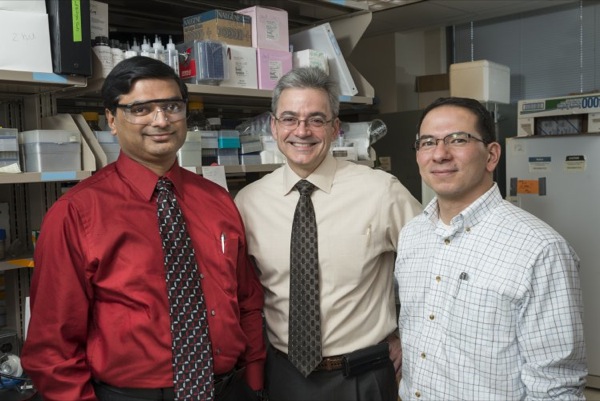
Cancer compound funded
Sikes, Koh awarded $200,000 grant for prostate cancer drug candidate
9:03 a.m., Jan. 18, 2013--Could a compound developed by two University of Delaware faculty members be a new line of defense against prostate cancer? Robert Sikes, director of the Center for Translational Cancer Research (CTCR) and associate professor of biological sciences, and John Koh, associate director of the Delaware Biotechnology Institute (DBI) and professor of chemistry and biochemistry, believe they have indeed invented a new class of cancer-fighting antiandrogens. Now, with a recent $200,000 QED proof-of-concept grant, equally funded by the QED Program and UD, they have the chance to prove it.
Antiandrogen drugs are the front line of drugs used to treat advanced cancer when surgery or radiation is no longer effective. According to Sikes and Koh, 20-30 percent of those patients treated with an antiandrogen become resistant to conventional antiandrogen drugs. The Sikes-Koh compound may prevent or delay the development of resistance by the cancer to antiandrogen treatment and may also slow or stop bone metastasis that has occurred as a result of the disease.
Research Stories
Chronic wounds
Prof. Heck's legacy
Sikes and Koh are scientifically optimistic about their compound because of the novel methodology used to develop it. “Antiandrogens are already effective in treatments for prostate cancer; the main problem with them is they too often succumb to resistance. To date, all current antiandrogen drugs have failed, meaning that the cancer came back,” said Sikes.
“We screened for resistance early on, which is not normally done,” said Koh. “There are three pathways through which current antiandrogens commonly fail, and our compound seems to work to suppress all three.”
Sikes and Koh filed an invention disclosure for their prostate cancer compound in 2006. The Office of Economic Innovation and Partnerships (OEIP), through its Technology Transfer Center (TTC), conducted the patent prosecution and provided early stage proof-of-concept funding to support the development of the invention. However, like many early stage technology inventions, the Sikes-Koh compound faced a standstill without additional funding sources that bridge the gap between fundamental science and practical applications.
In pursuit of funding to advance the invention, Joy Goswami, TTC senior licensing associate, served as project manager for Sikes and Koh, advising and assisting them with the development, marketing and funding of their compound. Goswami recommended that the inventors apply for a grant through the QED Proof-of-Concept Program at the University City Science Center in Philadelphia. “The QED Program is an excellent initiative established to support greater Philadelphia’s life science researchers and falls in direct alignment with the objectives of our OEIP office. The program fosters its unique partnership model to accelerate technology transfer and enhance the culture of innovation and entrepreneurism in the Greater Philadelphia region,” said Goswami.
Named after the Latin phrase “Quod Erat Demonstrandum” meaning “proven as demonstrated,” the QED Program was designed to help academic investigators with promising technology in the fields of life sciences and digital health advance their inventions through the proof-of-concept stage. Recipients of the award receive not only funding, but also business support throughout the entire 12-month period of the grant.
Goswami worked closely with Sikes and Koh throughout the program’s rigorous five-month selection process, advising and assisting with the required documentation and presentations. In the battle for funding, competition is fierce: QED received 56 proposals from 11 universities in its fifth cycle of applicants, and only four awards were given. The Sikes-Koh project is the first QED award for UD.
According to the American Cancer Society, prostate cancer is the second leading cause of cancer death among American men, and about one in six will be diagnosed with it in their lifetime. As their project advances, Sikes, Koh and Goswami hope to attract the attention of investors and major pharmaceutical companies that will help get the drug to market.
“Besides the funding, our project will continue to get commercial guidance from expert business advisers, industry executives and life science investors conferred by the Science Center, which will play a critical role in accelerating our commercialization efforts of the novel drug candidate against prostate cancer,” said Goswami.
About the Office of Economic Innovation and Partnerships (OEIP)
Since its formation in 2008, under the direction of former DuPont vice president for research and development David Weir, OEIP has worked with the state, Delaware Technology Park, numerous researchers and companies in creating a culture where innovation and entrepreneurship can thrive in Delaware.
The Technology Transfer Center (TTC), a unit of OEIP, is responsible for developing, managing and marketing the University’s intellectual property (IP).
Article by Laura Gleason
Photo by Evan Krape








